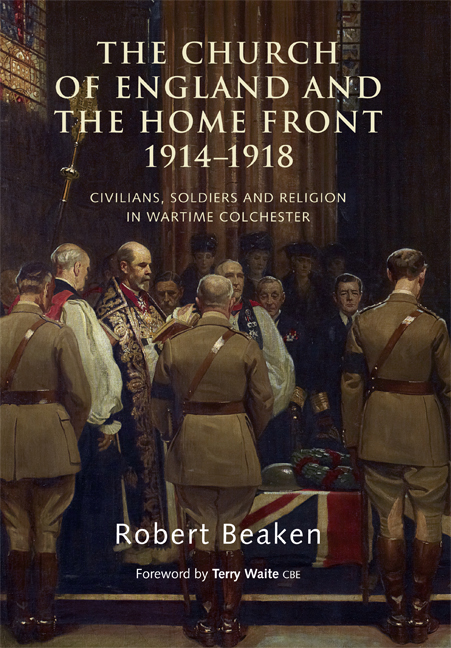 The Church of England and the Home Front, 1914-1918
The Church of England and the Home Front, 1914-1918 Book contents
- Frontmatter
- Dedication
- Contents
- List of Illustrations
- Foreword
- Author’s Acknowledgements
- 1 The First World War – One Hundred Years On
- 2 Colchester
- 3 Wartime
- 4 The Clergy
- 5 The Laity
- 6 Prayer and Worship
- 7 The National Mission of Repentance and Hope
- 8 Thought and Attitudes
- 9 Armistice, Remembrance and Aftermath
- 10 The Church of England and the First World War
- Bibliography
- Index
8 - Thought and Attitudes
Published online by Cambridge University Press: 11 May 2021
- Frontmatter
- Dedication
- Contents
- List of Illustrations
- Foreword
- Author’s Acknowledgements
- 1 The First World War – One Hundred Years On
- 2 Colchester
- 3 Wartime
- 4 The Clergy
- 5 The Laity
- 6 Prayer and Worship
- 7 The National Mission of Repentance and Hope
- 8 Thought and Attitudes
- 9 Armistice, Remembrance and Aftermath
- 10 The Church of England and the First World War
- Bibliography
- Index
Summary
To return to the England of 1914–18 is to enter a world that is both highly familiar to us a century later, and yet is as remote and strange as the England of Jane Austen. When it comes to understanding the thoughts and attitudes of the Britons who lived through the First World War, we are largely dependent for information upon what they wrote down; and, of course, what passed through their minds, and what they committed to paper, was not necessarily the same thing. In a world before radio, television or the internet, most people's understanding of the First World War was informed by newspapers and letters from soldiers at the front – both of which were censored – and by what troops said whilst home on leave. The historian is always prudent to exercise a degree of caution, and to avoid broad generalisations, when writing about the thoughts and attitudes of previous generations. Attitudes doubtless varied throughout the First World War, depending on news from the front, bereavement, anxiety, hunger and, of course, underlying personal religious and moral convictions.
Later in the twentieth century, the generation of 1914–18 came to be viewed by some writers and commentators with a degree of condescension. They saw them as somehow gulled or benighted, as people who unthinkingly supported a cruel and unnecessary war, which anyone with an ounce of common sense would surely have stopped (without, of course, facing up to how a war might practically have been averted in August 1914, or been stopped once hostilities had commenced). This, however, was to reflect backwards the very different views of the First World War which began to appear in literature half a generation after the Armistice and continued to find currency for much of the rest of the twentieth century. For similar reasons, oral history recordings made later in the twentieth century, although a very valuable resource for the historian, must be treated with a degree of caution: someone's perception of the First World War at the time of the Armistice in 1918, for example, may perhaps have altered by the time of the Depression in the 1930s, or after the Second World War.
- Type
- Chapter
- Information
- The Church of England and the Home Front, 1914-1918Civilians, Soldiers and Religion in Wartime Colchester, pp. 192 - 222Publisher: Boydell & BrewerPrint publication year: 2015


